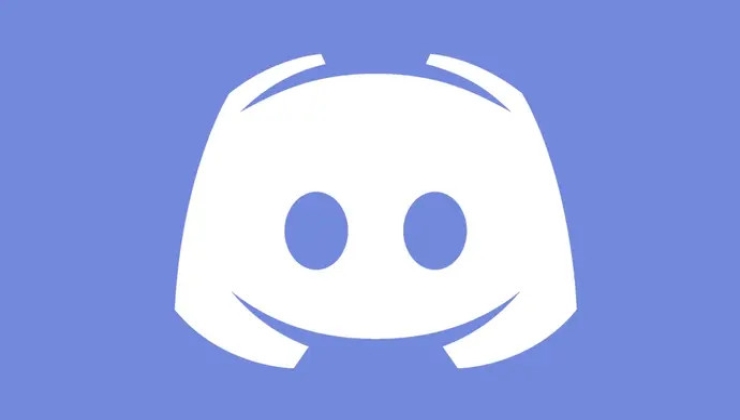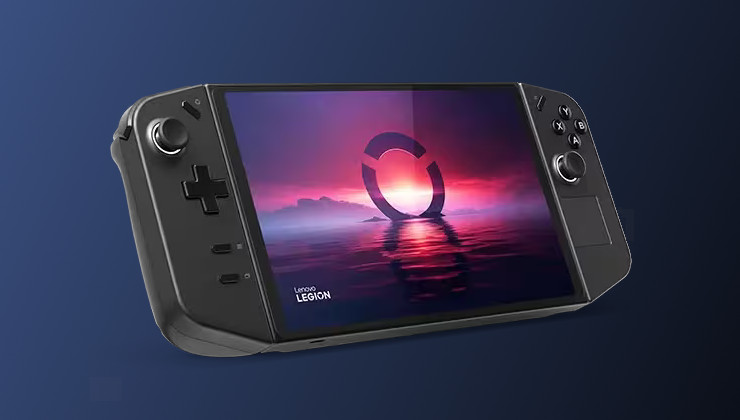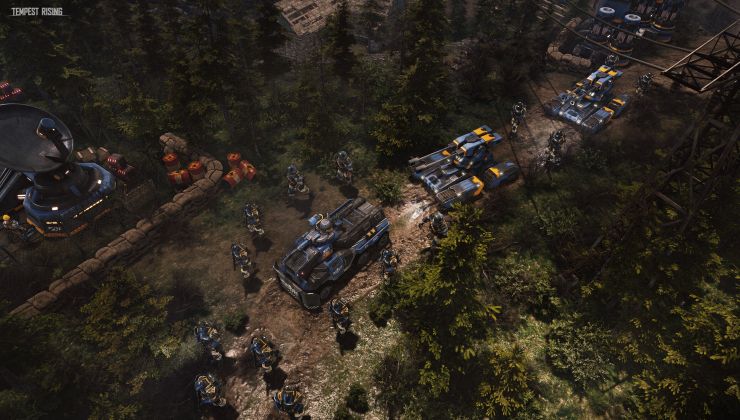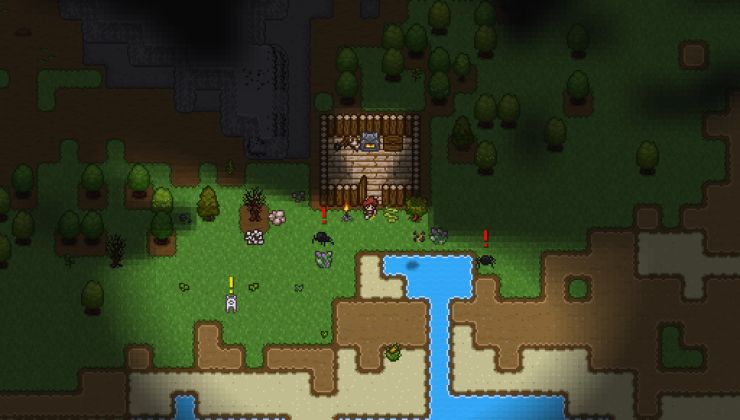Playtron are quietly building up their Linux-based PlaytronOS behind the scenes, and not only have they released their first Alpha but they've pulled in another investor too.
As a reminder: PlaytronOS was announced back in March, with a plan to bring their Fedora Silverblue based Linux system to as many devices as possible. They're not a hardware company though, think of them more like a vendor making a specialised version of Linux to ship to OEMs. Unlike SteamOS from Valve they are working on direct integrations with not just Steam but also GOG, Epic Games and other platforms directly inside the system. The first hardware that will be actually using it is the SuiPlay0x1, a strange looking and sounding web3 / blockchain handheld.
Just announced via a press release shared with me today, Square Enix Holdings Co., Ltd., have invested in the company. This is in addition to Samsung Next, Polychain Capital, Alumni Ventures, Mysten Labs and others that previously invested in them.
From the press release:
"Square Enix’s investment in Playtron underscores its commitment to driving innovation and enhancing player experiences and access," said Hideaki Uehara, General Manager, Investment & Business Development of Square Enix. "This collaboration aims to leverage Playtron’s"GameOS" to expand distribution of Square Enix’s portfolio of beloved franchises and explore new creative possibilities that are only possible when harnessing the full power of an operating system."
Playtron’s CEO, Kirt McMaster, added, “We are thrilled to join forces with such a legendary games publisher as Square Enix. The PC we know is morphing into new forms that require a purpose built OS for gaming that meets the demands of powerful new gaming hardware such as handhelds and new players who have grown up in a mobile 1st world with much more sophisticated UX sensibilities. This investment will accelerate the development and deployment of GameOS and create new experiences for players around the globe.”
Additionally, the first Alpha version of PlaytronOS has now been released for those of you who wish to test and give feedback. So far they note it has been tested across the AYANEO 2, ASUS ROG Ally, GPD Win 4 (2023), Lenovo Legion Go, Valve Steam Deck LCD and Valve Steam Deck OLED.
One of their developers kindly shared a bunch of screenshots of it in action (click to enlarge):
A lot of what they do is open source, but seemingly not all of it. In their FAQ they noted: "At first, only the operating system code will be open source. We have plans to open source more and release API documentation to allow developers in the community to contribute and build their solutions using Playtron.". They will also still have the anti-cheat problem that SteamOS has but they do say they're "working with interested partners to enable anti-cheat services".
Still early days, but it's looking pretty promising. The real test will be getting more known vendors to use it once it's further along in development.
See more about Playtron on the website. The first Alpha of PlaytronOS can be downloaded here.
Why do they take any money? Shouldn't they stay true to their branding and only accept NFTs or other blockchain crumbs?Lost the jpegs folder
Last edited by based on 3 September 2024 at 7:08 pm UTC
This investment will accelerate the globe. The PC we know is morphing into new players around the globe. The PC we know is morphing into new experiences for gaming hardware such as handhelds and create new forms that meets the demands of powerful new gaming hardware such as handhelds and new gaming hardware such as handhelds and deployment will accelerate the demands of powerful new experiences for gaming hardware such as handhelds and create new experiences for players who have grown up in a mobile 1.
I like it they need to keep it up.
Good Work
I know not to get my hopes up that this could lead to native ports, but hold on, you're telling me this thing can't even run native titles anyway? Why the hell not?
Actually it is not that simple to properly support native Linux games. I know this sounds ridiculous but hear me out.
To reliable support native Linux games you need:
- support for SLD 1.2 and older (Yes there is a SDL 2 to 1.2 compat library I know)
- support for out-dated version of glibc
- support for customized SSL / TLS libraries (hi Debian)
- Given they have AMD GPUs and therefore open source drivers you need to get support for old OpenGL games which do sometimes use probationary GL Extensions not supported by open drivers (hi og. Unreal)
- compatibility for game shipping long-out-dated Ubuntu 12.04 or even older libraries incompatible with up-to-date distros as some ship these libraries for some reasons (hi Feral)
- support for Open Sound Server (hi Metro 2033 Redux you can fix this by forcing ALSA as an environment variable)
and so one. Given PlaytronOS is immutable and based of Fedora and immutables usually tend to keep their footprint rather low. This would blow up the OS image by a significant amount of space and introduce security risks due to old libraries and a bunch of maintenance burden.
Plus most native Linux games have a garbage performance or greatly reduced visuals to keep some level of performance. Owing the fact that a lot of game devs had and still have very limited knowledge on how to do proper games for Linux.
Given the fact most of them are proprietary too they are unfixable.
I mean see certain proprietary drivers for certain a certain GPU vendor which form time to time have all sorts of random issues. This is given the fact that it is still actively maintained by the devs for up-to-date versions of Linux. Now imagine running a years abandoned native Linux game with all the same limitations and a huge lack of knowledge by the ppl who once ported the game.
Therefore there are three solutions:
1) Invent a sort of Linux runtime like Steam does and keep track of every single obscure native Linux game and what they require to run and then force the specific runtime. Not a great out-of-the box experience and a huge maintenance burden or
2) Simply force Wine / Proton + DXVK / VKD3D given the fact that most if not all games have a Windows version and usually out-performs the native Linux version anyway.
3) Use a distro as the base which is known to probably work with all those sketchy native Linux games which ofc adds up a lot of constraints to the way the underlying OS is made.
I can totally understand why some will not build support for native Linux games in a Linux device which is meant to be shipped to non tech-savvy ppl. Actually I am surprised there are some games on Steam Deck which prefer the native Version over Proton.
Don't get me wrong I am not on the fence where I yell "native support Linux is hopeless!" actually it is not "that hard" but it requires a significant amount of researched and the use of the right tools and tool chains. Which we all can agree most game devs never did.
Last edited by Vortex_Acherontic on 4 September 2024 at 7:04 am UTC
Playtron is a Linux based operating system that extracts the gaming ecosystem from Windows and supports every game store and many 3rd party integrations. It is optimized for powerful handheld gaming PCs and will launch later this year for Steam Deck and other devices.
404 Espresso Not Found.
I had to look up what a "Playtron is" ^^ ( -- At first I thought it was some kind of new SqureEnix launcher.)
I will give them the benefit of the doubt until all the facts are in and the thing is released. I do think there is space in the market for something like this. As a consumer it would be important to me that there is a public handshake with the game stores to feel confident enough to invest in whatever system they provide. At a glance their work seems pretty cool.
I have virtually 0 interest in EGS, but GOG is another story, also GreenManGaming and Fanatical were okay last I checked and I wouldn't mind having API directly in something like this.
Plus most native Linux games have a garbage performance or greatly reduced visuals to keep some level of performance.I don't know what you're talking about, this certainly doesn't sound like anything in my library.
Plus most native Linux games have a garbage performance or greatly reduced visuals to keep some level of performance.I don't know what you're talking about, this certainly doesn't sound like anything in my library.
- 7 Days to Die (Performance unless you use experimental Vulkan)
- Ark: Survival Evolved (reduce visuals, performance, risk of getting epilepsy due to flickering objects, as they still had the native version)
- Dreamfall: Chapters (reduce visuals, performance)
- Tomb Raider (2013) (Performance)
- Warhammer: 40K Dawn of War II (Reduced visuals, performance)
- Alien Isolation (Performance + Missing Features, Benchmark got removed)
- BioShock Infinite (Reduced visuals, performance)
- Deus Ex: Mankind Divided (Performance)
- Borderlands 2 / Pre-Sequel (Performance)
- Human: Fall Flat (Disabled cross play with Windows version, slight worse performance, missing content)
- Among the Sleep (Performance)
I could go on like this for hours. My personal observation is that around 90% of native Linux games can not compete with their Windows counter part and the user is probably best advised to run the Windows version. I mean there is a reason why Valve added the ability to force Proton and Windows on games back in 2019 shortly after they released Proton to the public.
See: https://github.com/ValveSoftware/steam-for-linux/issues/5638
Last edited by Vortex_Acherontic on 3 September 2024 at 10:37 pm UTC
Compatible with Steam only
Locked to the Valveverse
What the hell is the valveverse? Uhhh it can run more than just valve games? What on earth is this even supposed to mean other than having two contrived points
Other stores require decky loader to do it and still aren't as well integrated into the GUI as steam is.This does make some sense for the first bullet point but like I mean if I bought say an EA device and they let me install other launchers I would assume I may need to read a guide to get it working. Like I guess thats a bonus that this integrates them better but its also at the cost of functionality with losing native linux games.
It sounds ridiculous when you're basing your OS on one that already supports native Linux games.I know not to get my hopes up that this could lead to native ports, but hold on, you're telling me this thing can't even run native titles anyway? Why the hell not?
Actually it is not that simple to properly support native Linux games. I know this sounds ridiculous but her me out.
one that already supports native Linux games.
Did you read the post till the end? Because that is where the issue lies it doesn’t just because it is a Linux based OS.
Between SteamFork, Bazzite, ChimeraOS, and all of the other open source gaming distributions out there, what will this one do differently?Don't know about SteamFork (it just displays a blank screen, maybe because I have a Polaris card?) but compared with the rest, I think they're going for extreme minimalism, think something like Batocera maybe.
That if the current alpha is to believed, so likely is a bit premature to form a definitive opinion.
Other than linking your Playtron account to Steam/whatever and some minimal settings, there's nothing much else to do, no tweaking no nothing, just simple tiles to click install on, and play. If there's some minimal tweak/launch option that can make your game playable, you cannot do it, is only up to them to fix it. Again, maybe too early to tell.
I can't see many people going for this approach, but I suspect will make a niche of users very happy, especially on handhelds. It seems to work OK so far, every game I tried installed and played with no hiccups, and overall is a very seamless experience. I was also impressed how it automatically converted/sent 5.1 surround sound through optical cable, something that I always had to tweak around, no matter the distro.
Don't know about SteamFork (it just displays a blank screen, maybe because I have a Polaris card?) but compared with the rest, I think they're going for extreme minimalism, think something like Batocera maybe.
Could be something with the Polaris architecture, I think I have a Polaris card here so I can take a look at that. Batocera isn't minimal, it's pretty heavy.
I was also impressed how it automatically converted/sent 5.1 surround sound through optical cable, something that I always had to tweak around, no matter the distro.
This is a trivial thing to do, just need to check the capabilities of the connected device and match against a list of optimal profiles.
Yeah sorry, I probably remembered it wrong, but in any case I've meant the unified tiles interface.Don't know about SteamFork (it just displays a blank screen, maybe because I have a Polaris card?) but compared with the rest, I think they're going for extreme minimalism, think something like Batocera maybe.Batocera isn't minimal, it's pretty heavy.
It is trivial, ( even more these days) but none of the distros I tried did it out of the box without my intervention. And that was fortunate with PlaytronOS, since like I said, is a sort of a black box.I was also impressed how it automatically converted/sent 5.1 surround sound through optical cable, something that I always had to tweak around, no matter the distro.
This is a trivial thing to do, just need to check the capabilities of the connected device and match against a list of optimal profiles.
(though you can still drop to tty and do some magic)
Batocera isn't minimal, it's pretty heavy.Yeah sorry, I probably remembered it wrong, but in any case I've meant the unified tiles interface.
[/quote]
No worries, I'm very familiar with EmulationStation. I created JELOS and 351ELEC (Now known as AmberELEC) before starting SteamFork.
none of the distros I tried did it out of the box without my intervention
Yeah, forcing a setting like this works for some but can break for others so it's almost always left default for the user. There were a few devices we supported at JELOS that required forcing them into pro audio mode for audio to work at all, but on others that would break them.
Building a compatibility matrix could resolve that, but it would be a nightmare to maintain. It's pretty neat that they're doing it in PlaytronOS though tbh. I wonder if that component is FOSS.
I read the post till the end. The end was irrelevant. It doesn't matter how hard it is to support Linux native games, nor does it matter if Linux native games inevitably suxorz or whatever.one that already supports native Linux games.
Did you read the post till the end? Because that is where the issue lies it doesn’t just because it is a Linux based OS.
The point is, if
--Distro A does in fact support Linux native games
--Someone creates Distro B, which is based on Distro A
--And Distro B does not support what Distro A supports
--then that's ridiculous.
All the hard work you talk about has been done. Sure, they could deliberately decide to drop support for Linux games because they have a bee in their bonnet about how crappy Linux native support is . . . but that's ridiculous. And just for the record, I play almost solely Linux native games. They're fine.
My personal observation is that around 90% of native Linux games can not compete with their Windows counter part and the user is probably best advised to run the Windows version.I don't doubt that you can name a handful of examples, but I don't know how you got from that handful to 90%.
My personal observation is that everything in my library works just fine.
I wonder though what EpicGames would require from a mostly opensource platform to allow games like Fortnite.















See more from me